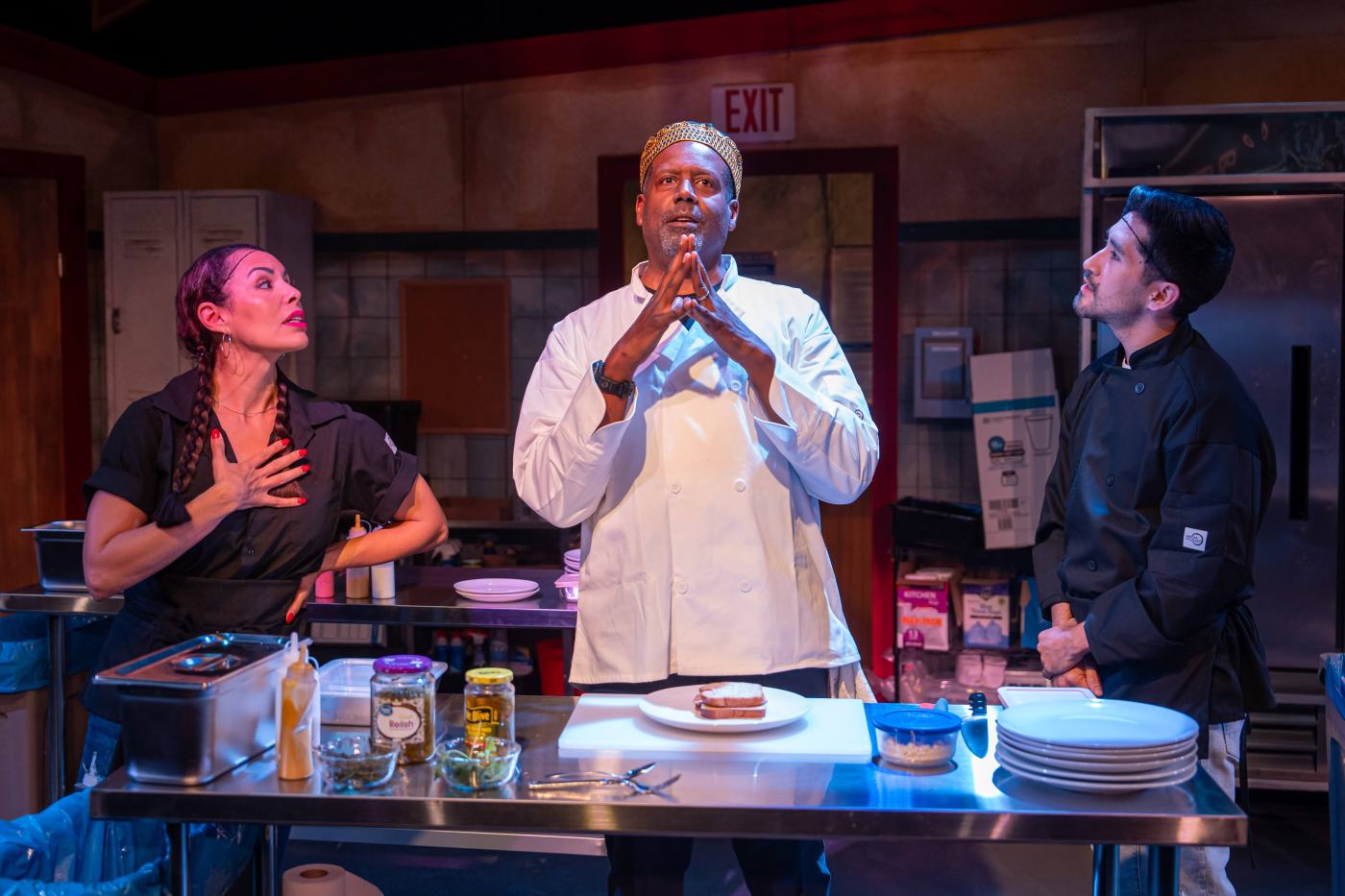Montrellous has mastered the ways of making the mouth water.
Let your ears swallow this talented sandwich-maker’s dish on the delish of ingredients, a man whose nuance with tomatoes and arugula isn’t simply reserved for respective shades of red and green. After all, the sandwich, in his nimble fingertips, “is the most democratic of all foods — it invites invention and collaboration.”
Montrellous is one of several employees at Clyde’s, a sandwich shop at the center of two-time Pulitzer Prize-winning playwright Lynn Nottage’s play getting a delicious crafting at City Lights Theater Company. Directed with many nimble strokes by Aldo Billingslea, Nottage’s character-driven storyline has some imbalance in performances, but many of the driving forces in the cast make the storyline tender, guttural and downright dank, to great effect.
Clyde (Kimberly Ridgeway) is the evil empress of the sandwich shop that’s revered among the trucker brigade in Reading, Pennsylvania. She hires a group of ex-cons, noble folks trying to stay on the straight and narrow after serious transgressions tinged with good intentions. There is Letitia (Damaris Divito), known as Tish, busted for snagging extra meds to sell while stealing other meds for her ailing daughter. Fellow employee Rafael (Ricardo Cortés) and his desire to buy his girlfriend a luxury pooch leads to a BB gun bank heist. Adding to the tension is Jason (Nick Mandracchia), whose perilous presence among the Black and Latino characters is accentuated by his facial white supremacist tattoos.
Head sandwich guru Montrellous (Fred Pitts) looks past these embattled souls’ backstories and finds grace in each, one of the play’s slickest traits. Who is this shaman sage of sandwich supremacy, a Zen master of mayonnaise? The reveal of his arc is a delight of the highest order.
Clyde drives the action, but the power of Nottage’s script succeeds succinctly when Clyde is off stage. The title character appears least often in the play, leaving us to learn the bulk about Clyde through those who work for her.
Ridgeway finds her stride in plenty of moments where she is parrying directly with those who challenge her, yet there are other times when that comes off a mite too tempered, feeling like there’s another gear of urgency that could be explored. One critical payoff in particular late in the play doesn’t reveal the necessary conviction in Billingslea’s staging, a moment that needs to be a critical turning point in the narrative.
The play’s sandwich makers each take turns stealing scenes, delivering empathically-charged performances that exploit the challenges of trying to turn their lives around. The skilled Divito’s Tish is full of contradictions, but also loaded with a self-engaged battle to accept the happiness she doesn’t feel is deserved. Cortés’ performance is a gem of range, with his joyful hubris contrasting mightily with tearful heartbreak. There’s one beautifully-paced gut-punch in particular played with sharpness between him and Divito.
Nottage’s penning of Montrellous and Jason into the world is a stroke of her premiere playwright pedigree, with Jason’s backstory built in the Pulitzer-winning play “Sweat,” where he beats a Colombian American busboy within an inch of his life.
As Montrellous, Pitts is quite a sage, going for a calming presence that sometimes feels too calm. Even so, he delivers a great soliloquy that reveals the mystery of what brought him to this restaurant, where his dignity is challenged by Clyde, who couldn’t top his artistry and integrity on her best day. Mandracchia is a man of levels, his process feeling driven by Jason’s pensiveness and reclamation.
City Lights is a company that tends to texture their productions very well, and this latest is another in that canon. Ron Gasparinetti has plenty up his sleeve in a scenic design that has a full-on kitchen and pass ready for culinary captivation. George Psarras creates a soulful cafe with a variety of sounds such as John Coltrane’s “A Love Supreme” and the three-instrument introduction of Duke Ellington’s “In a Sentimental Mood.” (In addition, pre-show Teddy Pendergrass is always the right answer.) And plenty of great props work from designer Laura Merrill makes its way onto the deceptively vast stage.
A line that stands out above most is supplied by Montrellous when he calls the bluff of Clyde — “We’re not replaceable, but we can be replaced.”
Lots of things need to be replaced to keep a restaurant going, but there is no short supply of dignity among these embattled sandwich savants. And when that dignity is placed between two slices of marble rye, the taste buds thrive beautifully.
David John Chávez is chair of the American Theatre Critics Association and a two-time juror for the Pulitzer Prize for Drama (‘22-‘23); @davidjchavez
‘CLYDE’S’
By Lynn Nottage, presented by City Lights Theater Company
Through: June 9
Where: City Lights Theater, 529 S. Second St., San Jose
Running time: 90 minutes, no intermission
Tickets: $38-$60; cltc.org












